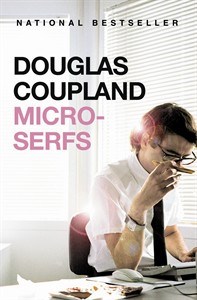
The cover of "Microserfs" by Douglas Coupland is seen in this undated handout photo. This year marks the 20th anniversary of the book which captures the state of the technology industry before Windows 95 and predicts the dot-com bubble of the late 1990s. THE CANADIAN PRESS/ho-HarperCollins
Republished January 28, 2015 - 5:20 PM
Original Publication Date January 28, 2015 - 1:20 PM
TORONTO - It's common today to see emoticons and abbreviated text on cellphones and computer screens, but it was quite unconventional to read the tech-speak in the pages of Douglas Coupland's 1995 novel "Microserfs."
The author of the acclaimed international bestseller "Generation X" gave diary-writing a digital touch in "Microserfs" (HarperCollins).
The novel's narrator, Daniel, logged diary entries on his Macintosh PowerBook and used unconventional formatting, smiley-face emoticons and condensed speech.
"'Microserfs' for me was about injecting art. I mean, there's all these weird experimental text pages and numbers," Coupland said during a recent interview in Toronto, where his art exhibit "everywhere is anywhere is everything is anything" opens Saturday at the Royal Ontario Museum and Museum of Canadian Contemporary Art.
Originally appearing in short-story form as a Wired magazine cover story in January 1994, he expanded "Microserfs" into a full-length novel.
Centred on a group of computer whizzes working for Microsoft, "Microserfs" offered a window into the tech industry in the early 1990s, examining both the corporate campus culture and the rise of startups.
Now, the novel also serves as a nostalgic snapshot of '90s pop culture, with references to Crystal Pepsi and popular night-time soap "Melrose Place."
Twenty years since the book's release, Coupland said technology has not only evolved with the times, but changed them for the better.
"It's interesting. You walk down on any street ... and probably six out of 10 people are talking, looking, this-ing, pointing, photographing, what have you. And my mother was saying: 'Oh, these people they're not connected to the world and what's happening?' And I said: 'Actually, it's the complete opposite of that," said Coupland.
"These are people that are trying to reach another person, they're trying to save the image so that they can share it with someone else.
"That's the weird thing about the Internet. You would never phone up a friend and say: 'Hi, come over to my house and we'll go on the Internet together.' That's just stupid, you know what I mean? It's this thing that you only do by yourself. Yet it's something you do by yourself that has this ability to create all kinds of new groups and organizations."
The Vancouver-based author and artist said he disagrees with the notion that the use of new technology is alienating.
"UFOs didn't come down and give this to us. We as human beings made it. We wrote it," he said.
"Even if the Internet turns into a great big smart sentient singularity tomorrow, it's still only going to be an expression of our humanity — however way it got there. And we're only going to learn new aspects of our humanity that we might never have known about."
— Follow @lauren_larose on Twitter
News from © The Canadian Press, 2015